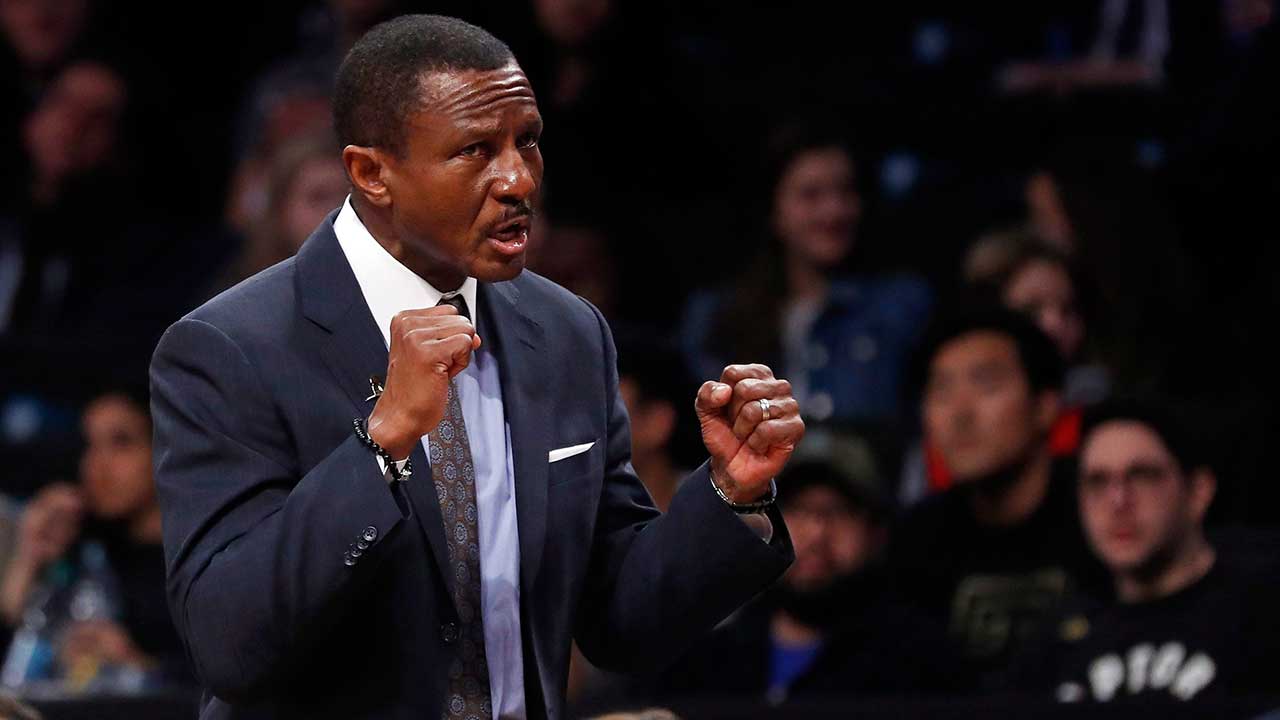When the Pistons announced the hiring of Dwane Casey to take over head coaching duties from Stan Van Gundy, I was lukewarm. There were 2 or 3 others I liked better, but Casey was a solid candidate. More than solid, in fact, having come off of a Coach of the Year season, winning 59 games but getting swept by Cleveland in the quarter finals.
The end of the Raptors' season, as well as Casey's rep as a sub-par Xs & Os guy, caused me to treat the news of his hire slightly better than I did the hiring of Maurice Cheeks. I acknowledged he was an improvement over the last guy (Van Gundy), but only just. This really wasn't fair to Casey.
First of all, who is Dwane Casey?
The end of the Raptors' season, as well as Casey's rep as a sub-par Xs & Os guy, caused me to treat the news of his hire slightly better than I did the hiring of Maurice Cheeks. I acknowledged he was an improvement over the last guy (Van Gundy), but only just. This really wasn't fair to Casey.
First of all, who is Dwane Casey?
He was a top recruit out of high school, went to Kentucky, but never really put it together as a player. He spent his off seasons working in the coal mines or tobacco farms, and during the season he was an end of the bench guy, averaging about a point a game. After his playing days, he came up as an assistant at Kentucky, first teaching Rupp's complicated 6-8-10 offense to Sam Bowie, then as a recruiter and running practices. A recruiting scandal - Casey was later proven innocent and settled in a defamation lawsuit - blackballed him from the NCAA and pushed him to coach in Japan. He finally caught on in the NBA as an assistant with George Karl in Seattle. Eventually, his first head coaching gig materialized in Minnesota.
Casey was an unfortunate casualty of too high expectations there, was fired in the middle of his 2nd season (with a 20-20 record) and ended up in Dallas as an assistant. In fact, his defense was credited as key to Dallas's 2011 Championship over the Heat. This got him the Toronto job, where he turned the Raptors into regulars atop the Eastern Conference standings. Ultimately, a second straight sweep against the Cavs was his undoing.
What can we expect?
Casey is markedly different from Stan Van Gundy in several key ways. He's more patient and focused on developing players, something Toronto's players attributed to their success as the top bench unit in the NBA. Calling him a "player coach" insinuates Casey is soft, which he's not, but he's definitely easier to get along with than SVG was.
As good as Stan Van Gundy's rep was as a strategist, I didn't really see the evidence of it. He designed a decent defense, but the offense never really worked and he failed to game plan for obvious challenges (like Philly having a guy named Ben Simmons on their roster). While SVG's game planning was overrated, Dwane Casey might be a victim of being underrated in that regard. He changed the offensive style from his earlier years in Toronto to be looser, faster, and to involve more movement. He made radical in-game moves that helped his team win, like throwing a 6'4" defender at the 7'0" Kristaps Porzingis so Patrick Patterson could D up on Carmelo, or aggressively trapping Kemba Walker in a game he was killing them, or telling his best two players they would be decoys on a buzzer beater play.
As good as Stan Van Gundy's rep was as a strategist, I didn't really see the evidence of it. He designed a decent defense, but the offense never really worked and he failed to game plan for obvious challenges (like Philly having a guy named Ben Simmons on their roster). While SVG's game planning was overrated, Dwane Casey might be a victim of being underrated in that regard. He changed the offensive style from his earlier years in Toronto to be looser, faster, and to involve more movement. He made radical in-game moves that helped his team win, like throwing a 6'4" defender at the 7'0" Kristaps Porzingis so Patrick Patterson could D up on Carmelo, or aggressively trapping Kemba Walker in a game he was killing them, or telling his best two players they would be decoys on a buzzer beater play.
Probably the biggest difference between SVG and Casey is his trust in the role players. Casey let his players play through struggles and slumps, while a couple of bad games from a rookie might mean a trip to the G league under Van Gundy. It took Stan about 12 games before he was using rookie Luke Kennard, a player with a dead-eye 3-point shot that the team desperately needed, as a rotational fixture. Casey used his rookie OG Anunoby right off the bat. In the playoffs, Casey played 10 players at 15 mpg or more, and only 2 players got more than 30 mpg. In Stan Van Gundy's one trip to the playoffs here, he leaned heavily on the starters and gave only 6 players more than 11 mpg. Let me say that again - in Detroit's only playoff trip under Stan Van Gundy, only 6 players averaged more than 11 minutes per game!
Casey isn't married to a lineup if he sees a beneficial matchup. He will switch to zone, he'll trap, and he will change, and possibly improve as a coach. SVG did none of those things. He was inflexible, didn't change, didn't improve. Casey might not be the most innovative offensive mind, but at least he's not mired in the past, and he's willing to move into the future.

